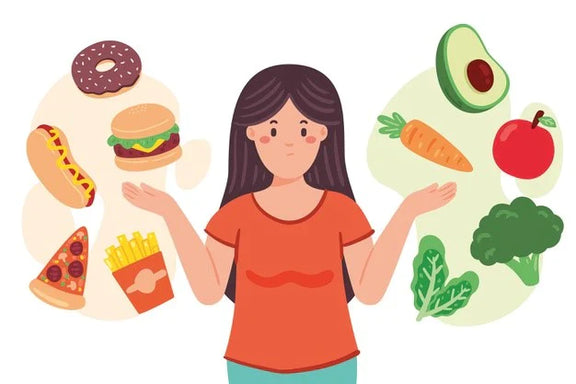
Think Moderation (for Your Expectations and Your Meals)
One thing you should avoid is an “all or nothing” approach. Cutting out each and every remotely unhealthy food item from your diet is not just unrealistic but also completely unsustainable in the long run. A healthy diet is something you build over time and one that you can easily stick to for the rest of your life. This is why your first step should be to set realistic expectations. Think about why you want to change your dietary habits, what benefits you expect from these changes, and what your personal motivations are for doing so. It could simply be because you want to lose extra weight, improve your health, or strengthen your immune system. No matter your reasons, don’t throw yourself into a restrictive diet immediately. Instead, focus on making the right choices for your diet and take it one step at a time. The same goes for your meals. Whether you are consuming healthy or unhealthy foods, practice moderation. Experiment with smaller portions. Try adding in healthier foods a little at a time, increasing the percentage of healthy foods over a few weeks and months instead of days.Plan Your Meals Ahead
Being organized can go a long way in maintaining a healthy diet. Thankfully, you can find many meal plans online shared by nutritionists and healthy eating advocates. So instead of trying to figure out what you should eat, that qualifies as healthy, try following tried and tested combinations and meals. This will also help you immensely when grocery shopping. When you know what you plan to cook, you will know exactly what to buy too. Sticking to your grocery list and not deviating is step one in curbing your addiction to unhealthy snacks or pre-made meals. Last but not least, the best way to maintain a healthy diet is by cooking it yourself. Even if you are not a master chef, who’s to say you can’t become one? Seek inspiration from online recipes or simply adapt them to create your own recipes filled with healthy, vibrant ingredients. This will keep you away from any processed foods that should be minimized as part of a healthy diet.
Be Mindful
When it comes to what to include in your meals, you don’t need to start adding up calories or checking the nutritional value of each ingredient. Just be mindful about things like adding more fruit and veggies to your meals and avoid overly processed foods. Making the right changes to your diet is about cutting back on unhealthy foods and replacing them with healthier alternatives. For instance, instead of ordering pizza for dinner, you can instead make your own with whole-wheat flour and healthy toppings such as veggies, lean meats, and dairy-free sauces. When you are grabbing a snack or a meal on the go, be mindful of the label and ingredients. Try to avoid foods that are high in fats, added sugar, or excess sodium.
Get Rid of Unhealthy Foods or Snacks
You should also make sure that you rid your home or office of unhealthy snacks…you can't be tempted by them if they’re not there! Instead, stock up on healthy alternatives such as whole-grain crackers, vegetable sticks, dips, and pre-portioned sorbet or ice cream. Again, it’s all about being mindful and remembering why you are making this lifestyle change.
Make Healthy Eating a Lifestyle
Last but not least, when you decide to embrace a healthy diet, consider it a part of your new lifestyle. If you see it as a short-term diet, you’ll no doubt be excited in the beginning, but chances are your motivation will start to dwindle a few weeks into your journey. This is where thinking of a healthy diet as part of your lifestyle instead of just a temporary habit will help you stay on track.That said, the many benefits of a healthy diet can make a huge impact on your quality of life and your overall health. However, eating healthy is not easy all the time. So, whenever you feel it’s getting a little too complicated, just use these simple tricks and get yourself back on the horse. You’ve got this!View this post on Instagram




